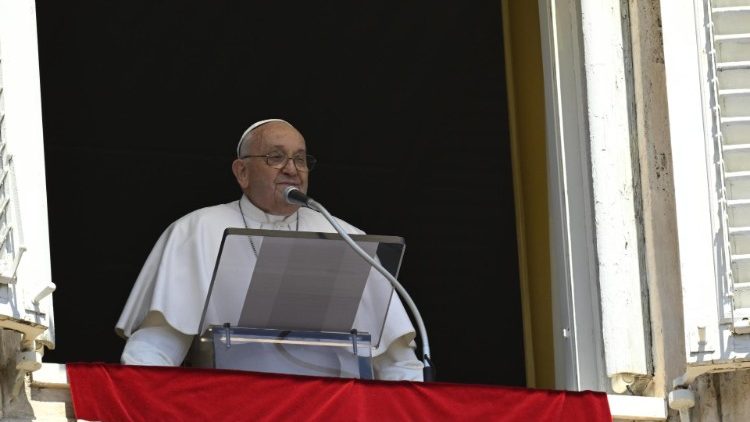The Universal Declaration at 75: ‘commitment to human rights is never finished’, says pope
Speaking from the window of the Apostolic Palace, Pope Francis mentioned that the document signed in Paris in 1948 “is like a master plan. Many steps have been taken, [and] many still need to be made”. Renewing his plea for peace in the Middle East and Ukraine, he urged protection for “civilians, hospitals, places of worship”. He praised Armenia and Azerbaijan for freeing prisoners of war. “I encourage the parties and their leaders to conclude the peace treaty as soon as possible.”
Vatican City (AsiaNews) – Following the Sunday Angelus, Pope Francis spoke about the Universal Declaration of Human Rights adopted by the UN General Assembly in Paris exactly 75 years ago.
“[O]n 10 December 1948, the Universal Declaration of Human Rights was signed. It is like a master plan. Many steps have been taken,” Francis said. With many conflicts raging in the world and multiple crackdowns on rights, “many [steps] still need to be made”, he added.
Sometimes, “steps backward have been taken. The commitment to human rights is never finished!” he explained. expressing closeness to those who, every day, “without fanfare, in concrete daily life, fight and personally pay the price defending the rights of those who do not count.”
“[S]peaking of human rights,” the pontiff emphasised the importance of the declaration for “protecting civilians, hospitals, places of worship, freeing hostages and guaranteeing” humanitarian aid.
The pontiff issued yet another appeal for greater efforts towards peace, especially in Palestine and Israel, as well as in "battered Ukraine".
The situation in Gaza is of greatest concern, especially after the United States vetoed a United Nations resolution calling for a ceasefire, which Francis has demanded on several occasions.
About 17,700 people have died in the Gaza Strip, according to the Hamas-run Ministry of Health. If this humanitarian crisis continues, escalation is a real possibility.
On a positive note, following a joint statement by the Office of the Prime Minister of Armenia and the Presidential Administration of the Republic of Azerbaijan, Francis “welcome[d] the release of a significant number of Armenian and Azerbaijani prisoners,”
Azerbaijan reportedly agreed to release 32 Armenian prisoners of war, while Armenia agreed to release “2 Azerbaijani military servicemen.”
“I look with great hope on this positive sign between Armenia and Azerbaijan, for peace in the Southern Caucasus, and I encourage the parties and their leaders to conclude the peace treaty as soon as possible,” the pope said.
Azerbaijan is set to host COP29 next year, with Armenian backing. Francis cited the Conference on Climate Change currently underway in Dubai, which will end next Tuesday, 12 December.
“I ask all of you to pray for a good outcome for the care of our common home and the protection of people,” he said referring to it.
Today, the second Sunday of Advent, Pope Francis appeared from the Apostolic Palace. In the previous two Sundays, he recited the Angelus prayer from Casa Santa Marta. Today, he urged the faithful to “continue to pray for the populations who are suffering because of war.”
“We are heading toward Christmas,” he told the crowd in St Peter’s Square, where the Christmas tree and the nativity scene were inaugurated yesterday afternoon. “Are we able, with God’s help, to take concrete steps of peace? It is not easy; we know that. Certain conflicts have historically deep roots.”
In taking these steps, he proposed to be inspired by “the testimony of men and women who have worked wisely and patiently for peaceful coexistence.”
In his commentary on the Word of the day (Mk 1:1-8) that preceded the recitation of the Marian prayer, Pope Francis focused on the "precursor of Jesus", John the Baptist, who is described in the Gospel as “the voice of one crying in the desert (v. 3)”.
“The desert,” he explained, is “an empty place, where you do not communicate; and the voice, a means to speak – these seem like two contradictory images. But they are joined in the Baptist”.
Indeed, the desert, near the Jordan River, where John preached, “is the place of silence and essentials, where someone cannot afford to dwell on useless things, but needs to concentrate on what is indispensable in order to live. And this is an always relevant reminder: to proceed on the journey of life, we need to be stripped of the ‘more’”.
The voice, according to the second image analysed, “is the means by which we manifest what we think and what we bear in our hearts.” This, the pope notes, is very much connected to silence, a constant presence in the desert. "[I]f someone does not know how to be quiet, it is unlikely they will have something good to say; while, the more attentive the silence, the stronger the word.”
14/01/2021 13:34







.png)










